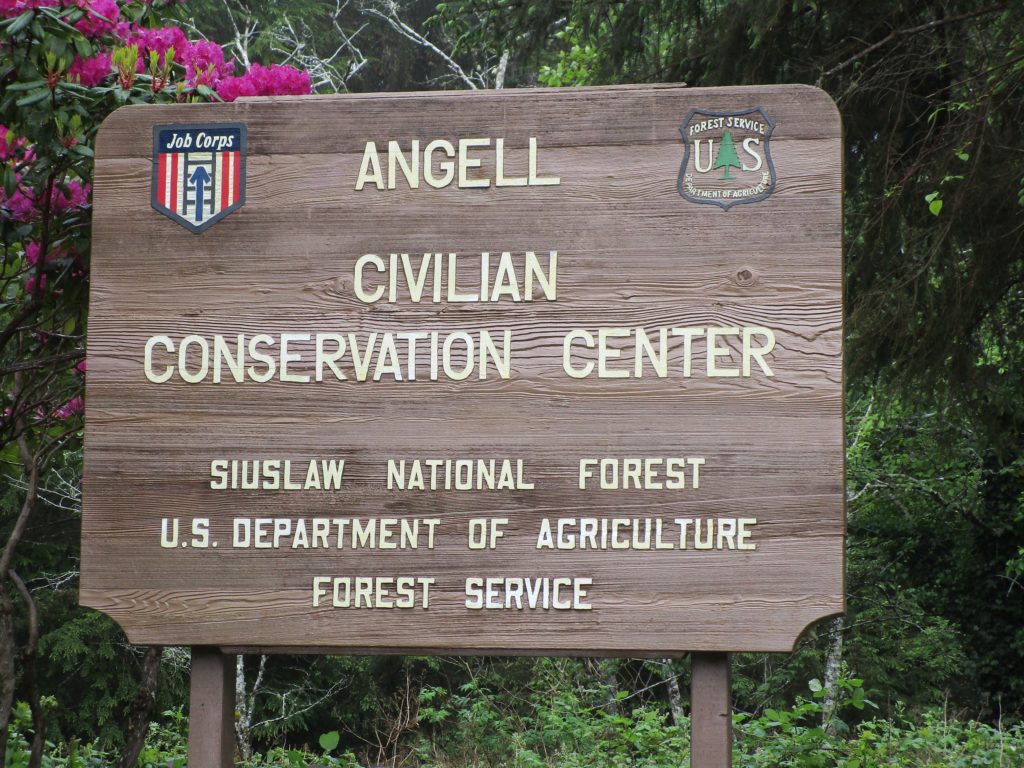
By ELAINE WATKINS/YachatsNews.com
It’s not often you hear a young person reply, “Yes, sir,” or “No, ma’am,” but that demonstration of respect is standard at the Angell Civilian Conservation Center north of Yachats. Not a written rule, students explain, simply part of the culture.
Respect, responsibility, self-management, perseverance, and leadership. Those traits are embedded in every aspect of life at “the center.”
Disadvantaged students age 16-24 apply for acceptance into the free program, agreeing to an extensive set of rules for up to two years. They wear center-issued clothing, including belted pants, and sport natural hair colors. They get themselves up at 6:00 a.m. — staff will provide alarm clocks if needed — and are at meals on time. They report to work and meetings punctually. They go to bed at lights out.
Upon arrival, the students are issued a green-level ID card. It’s up to them to find ways to work up through the ranks of silver, blue, orange, silver, gold, and finally, the elite Orca.
Daily tasks include personal hygiene, facility cleanliness, and landscaping. Student leaders see that other students take care of business. Students get tested for drugs and alcohol, and they must stay clean. To rise through the ranks, students must go above and beyond by their own initiative.
Leadership is a core value at the center. Students serve on committees, like the Student Government Association. They initiate clubs and activities, such as journalism or the Gay Genders and Sexualities Alliance.
Angell’s students perform thousands of hours of community service — everything from rebuilding stairs leading down to the Yachats River bay to serving pancakes and coffee at Lions Club breakfasts.
“If you’re bored, you’re not doing things right,” says Orca-level dorm captain José Espinoza.
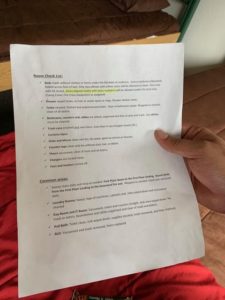
Students attend classes to earn a level-two high school diploma, which can open doors to the military or college. They choose and practice a trade and can earn the right to “do fire,” which at the center means they can learn wildland fire management and work summers with the Forest Service to earn money.
There are classes on budgeting, finance and checkbook management, cultural diversity, workplace etiquette, interviewing and resume writing. For behavior infractions, student leaders and staff convene a review board to decide if the offender deserves a second chance. Often the answer is yes, but that reprieve comes with higher standards.
The discipline and values at the center are often one of the last chances the youth experience in getting the structure and education they’ve missed. The staff acts as teachers, parents, mentors, and cheerleaders for youngsters who may have been homeless, abused, in foster care, or impoverished.
The Angell Civilian Conservation Corps has been run by the U.S. Forest Service since 1965. It now has 45 federal employees, 20 contractors and a $5 million yearly budget to education, train and rehabilitate 115 students. Although 17 of the 25 top-rated centers were run by the Forest Service, as of this spring Angell ranked 80th of 117 Job Corps Centers based on educational success, training completion and job placement.
Last month the Forest Service announced it will close nine of its 25 centers and on Sept. 30 turn 16 – including Angell – over to the U.S. Department of Labor. That agency, which already operates 98 centers across the country, will transition Angell, with its closed campus and military-inspired practices, to a for-profit program run by a contractor.
Forest Service employees are upset about losing their jobs, with little hope of transferring to other agency or federal work. Students are worried about their path toward earning a trade certificate or diploma. Many Yachats-area residents wonder what will become of their relationship with the center, which has long been a part of the fabric of the community. Oregon Sens. Jeff Merkley and Ron Wyden last week introduced legislation to try to prevent federal agencies from spending money on the closures or conversions, but its prospects for success is uncertain, at best.
Last week, YachatsNews.com outlined the long, complicated history of the Job Corps and the Angell Civilian Conservation Center and the Trump Administration’s decision to concert it to a contract center. This week it presents the stories of 11 students in their own words.
José Espinoza, 20, Park Place dorm captain
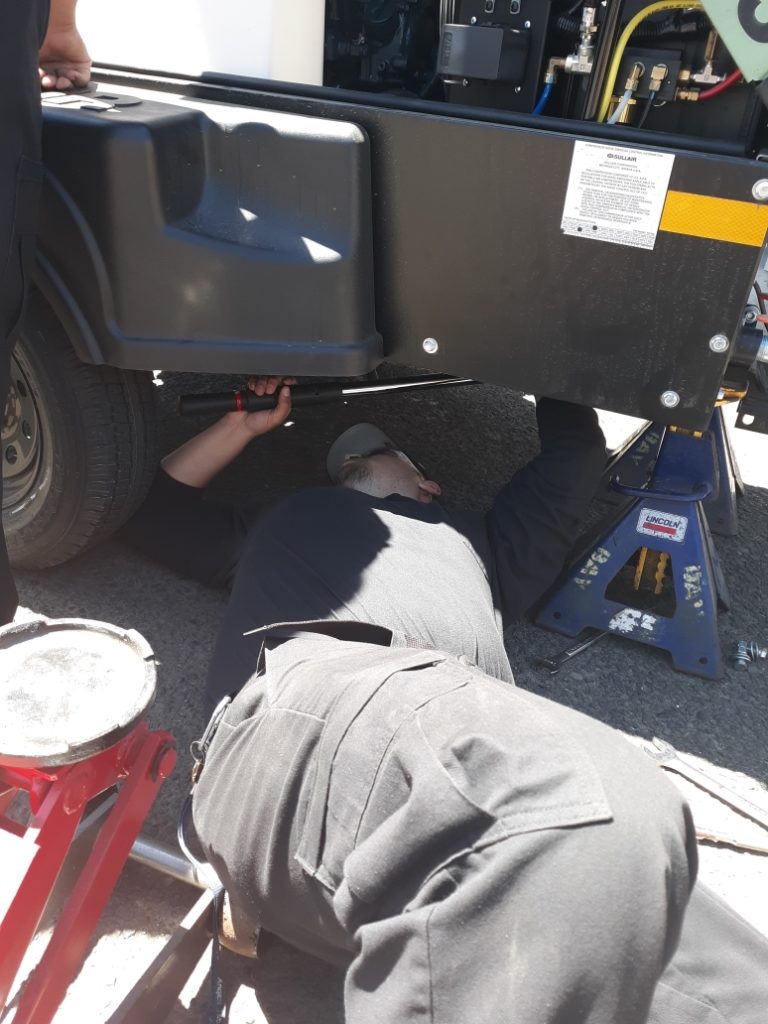
My parents are from Mexico. My dad was always telling me I had everything here, that I should keep going on my education. But I got expelled sophomore year from Beaverton High School, so I joined the Oregon National Guard’s Youth Challenge Program to better myself and gain some credits. It’s a boot camp. They yell at you and get in your face, but I got a diploma. Then I got accepted into Beaverton’s Health and Science High School, and I eventually got a second diploma from Merlo High School. I came here about two weeks after that.
I prefer this program to OYCP because it’s like family and you can get leadership skills. I moved up the ranks pretty quickly — safety leader, hygiene leader, wing leader. Now I’ve been dorm captain for 6-7 months. Things go through me before they get to the staff. I do orientation for the new students and help the staff by making sure there’s no horse play or rules violations. I fix problems and make sure the students’ stay here is comfortable. Basically, I help people have a good day.
I get the weekends off and can do outside work — anything the community needs, like moving or yard work. If this place becomes a contract center, that goes away. No weekend work, no community service, no fire. Fire is an incentive. Once you’re caught up in trade and school, you can do all the steps to become a wildland firefighter. It’s a career path. They send us out for 14 days at a time, 16-hour shifts. Then you get two days off. We come back with money in our pockets to put into an apartment or to buy a vehicle.
I went back to my dad and said, “Don’t ever tell me you’re tired from work again.” You earn every penny you work for. It’s seasonal and then you can apply to become a firefighter with the Forest Service. That’s another thing we’ll lose if we become a contract center.
I’ll be out in July, and I feel bad that if we become a contract center, my little brother won’t be able to experience what I have, working with the staff here. They’re like family.
Garrett Bell, 19, safety committee leader
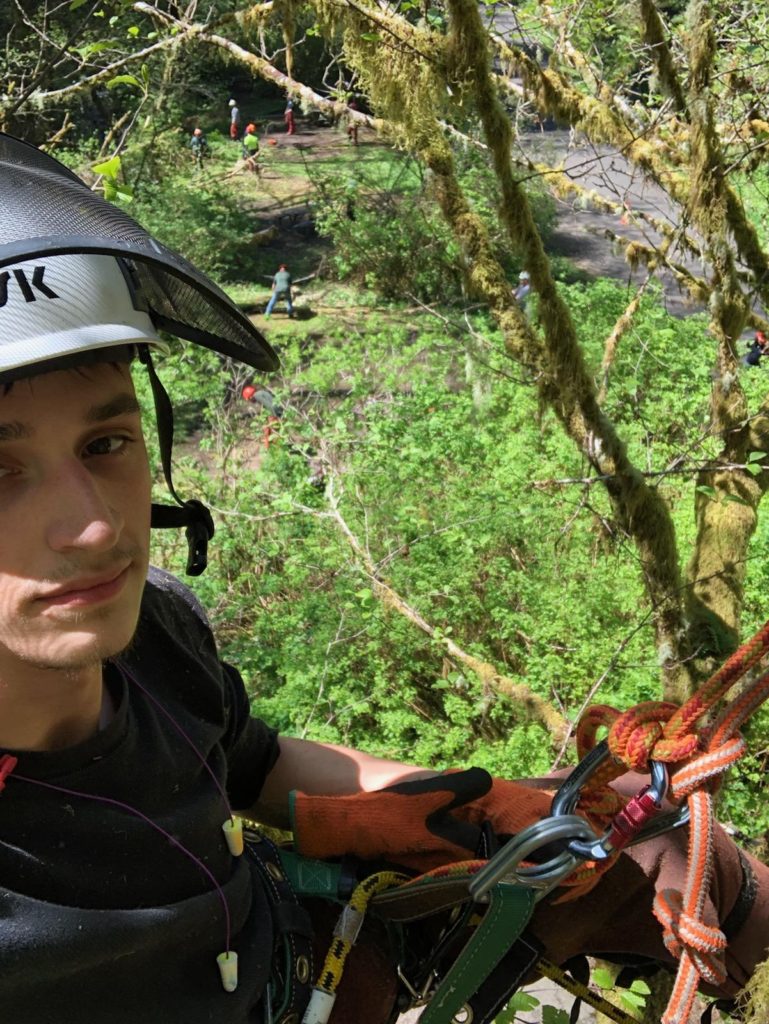
Coming here was a split decision between me and my family. The classroom environment at North Salem High School wasn’t working for me with my ADHD. Imagine sitting at a desk from 7:10 a.m. till 2:20 p.m. The only thing I enjoyed was the woodworking program, and I still needed 15 credits my senior year. But then I had a really bad accident. I was riding my longboard down a hill and a car pulled out in front of me. I hit the car and went over the hood. Slid for about 80 feet. It destroyed my back and scarred my arms and face. So I came to the center to do self-paced work and get job training. It wasn’t looking good for carpentry because I couldn’t stand for hours at a sawhorse, so I decided to join the forestry program because I heard that would strengthen my muscles. At first, I didn’t have high hopes, but somehow it worked. Straightened my back and gave me 80 percent recovery. Plus, it gets me out in nature; you can’t get closer to nature than being up in a tree.
About midway through my stay at Angell, I realized I wanted my own children to be in a program like this one someday. But if Angell doesn’t stay a conservation center, that won’t be possible. Contract centers run differently. Any money they don’t spend on the students goes straight into the company’s or directors’ pockets at the end of the year. It becomes a bonus. Most of the employees they hire get paid minimum wage so they can run the centers as cheap as possible. Right now, if there’s an overage of money, the Angell staff tells us and then gets our input on how to spend it back on the students. Library, more Wifi, outings like ziplining, or better food. Extra money immediately benefits the students, but that won’t be the case if it becomes a contract center.
This has been a life-changing experience. It’s made such an impact on me and I will never forget this place. I grew up with a family struggling to make house payments. My mom has worked two full-time jobs for two years now just to pay the rent. Income was always a struggle. I see it as I’m going to be able to support the family I love and cherish when I grow up. That’s why I picked forestry. With forestry, you have to focus on lots of things at one time, which works for someone with ADHD. I’m proud to have ADHD; it’s not a disability. In my new career, it’s an ability.
Sierra Libel, 19, classroom leader, room leader, fire and camp crew

I ended up here because I decided to drop out halfway through high school. I was homeless at 16. There were little jobs here and there as a waitress or in a nursing home, but I just wanted to live the straight life. After two months of being clean, I had to decide between the Job Corps and the Navy. I always wanted to travel, but for the Navy, you have to have a diploma. I decided to get my diploma here.
At first, I was just going for painting to have that under my belt, but I really wanted to be a Navy firefighter. Then I ended up falling in love with plumbing. I like this center being a Forest Service center because it’s a closed campus. For me, coming off the streets and being freshly clean, I needed that. I know something about closed vs. open centers.
I had a friend who went to an open center. She was a good kid, but there was so much drugs, drinking, and fighting. My friend went downhill and got into trouble. You need that extra structure and support from a closed campus. I also like the program that helps us with addictions. I spearheaded getting regular weekly meetings set up. I’m big into recovery.
Part of my work is to do retention and outreaches, which is where I go off center and talk to other students. The staff has been by my side in helping with that. When I get out, I plan on doing plumbing service and repair work, hopefully in St. Helens. As I get older, my goal is to become a detox counselor. One big deal for me personally is the education part of things. I like that you can get a real high school diploma. A lot of people use Angell as a bus ride to get to get to the military or college because here it’s a level-two high school diploma—not a GED. Contract centers don’t do that because it’s cheaper to just run a GED program.
Thomas VanReed, Jr., 22: recent transfer from Centennial CCC
This is my second time in Job Corps. The first time I signed up for Columbia Basin in Moses Lake, Wash. My mother had threatened to send me there and made it sound pretty bad, so I had some anxiety going in. I didn’t take the program seriously, and I wasn’t as structured as I needed to be. I got through the program quickly, though — eight months as opposed to two years.
But after spending time working, I knew I needed more training, so I went to Centennial. I got the news the center was closing the day I was accepted into my trade. At first, I felt hopeless, but then I learned I could come to Angell. I’m training in carpentry now and taking it seriously.
I’m also planning for every possibility for when I get out. I might work on the dry docks in Bremerton or go back and live with my sister and work in Boise. I want to get my advanced training by joining the union. But I don’t get why they closed Centennial. It was one of the top five Job Corps centers in the nation.
When I first got here, boy was it pretty. It threw me back. I’ve always loved forests, and I love knowing I can stand outside and listen to the ocean. It’s really breathtaking at times.
Madison Hansen, 17, dorm hygiene leader, trades safety leader, Cultural Diversity Club president
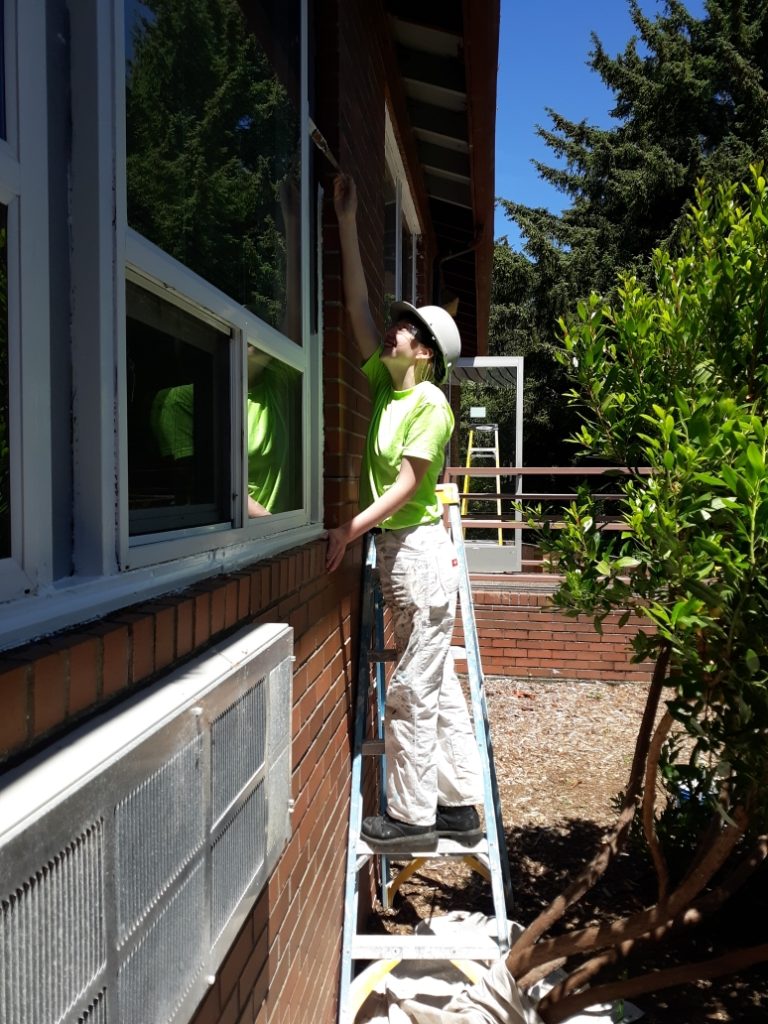
I grew up with my mom in north Salem and went through some abuse. I spoke out about it and moved in with my dad, but there was always nagging — hair, makeup — he and my stepmom wanted me to look like this perfect person. I couldn’t be that person, couldn’t have straight A’s, go to college, have a really great job.
I wasn’t a very smart student, and they got tired of my attitude and refusing to change. They said it was the streets or here, so I chose here. I’m a painter because it’s go, go, go. I have ADHD, so that’s a good choice. I also like that there are lots of projects, never just sitting around.
One of my favorite projects will be going to Cape Perpetua Visitor Center to spray the entire exterior. We did the education building here and had to be careful to avoid painting the bricks. I have a steady hand for painting, and you have to be careful and tidy.
Being here has taught me a lot because I arrived with anger issues. I let things build up and then there would be an explosion. I really like the closed campus. It’s safe, and you can come in dirty and then you have 30 days to do another UA and be clean and stay here. It’s saved my life and a lot of kids’ lives. If this place switches over to being a contract center, there’s no second chance. You’d have to come in with a clean UA to stay. Everyone deserves a chance to be able to get clean because if you turn away everyone who comes in dirty, they’ll never be able to get their life together. Then you’d have more people using drugs who wanted help but couldn’t get it.
Dustin Rizzo, 18, Honor Guard, student government representative, hygiene leader

I was a three-time high school dropout in Idaho, and eventually I got expelled. I had a pretty bad drug habit and lived all over the place, sometimes with my grandparents, sometimes on my own. It’s been an uphill battle, for sure.
I chose Angell because it’s farther away from home. Here, they would drug test me and help me. I wanted to get my life back on track, but I didn’t know it would help me as much as it has. I’ve overcome a lot of his obstacles, like having a home with limited stability. Now I’m clean and staying in one spot. Angell has been more of a home than my house ever was. My parents disciplined me in a pretty harsh way, but I feel like I belong here. I can wake up every day and think clearly and feel nice.
When I came here, I looked at Honor Guard and decided that’s what I was going to do. I quickly rose in rank and worked my butt off to get where I was. I earned my first rank as specialist, then moved up to staff sergeant, then I was running Honor Guard as first sergeant. It was a lot more responsibility than I’d ever had in my life, and I was also doing my trade and school and was a hygiene leader. It was run, run, run all the time. That was good training for the Marines, which was something I’d held in my mind for many years. Then a teacher said I’d be good at that, and it became my goal.
I’m in urban forestry now. I loved it from the first moment I tried it — climbing, chainsaw, limbing trees. I have just three credits left to earn. I completed English 11 today, which is awesome. I’m not very good at understanding what I read, but Mr. Hamilton pushed me to get it done.
A lot of the staff members here graduated from a Job Corps center. There are some success stories right there. The nice thing about having those staff members is that they can relate to what we go through. It’s nice to be able to communicate with them.
I should be done in October, and when I get out, I’ll be moving directly into the Marine Corps. I’ll serve for four years, and then the Marines will pay up to $70,000 for my education. Food, housing, tuition, and all that. I’ll go to lineman training in Idaho — they’re the guys who remove branches from power lines. The leadership and urban forestry at the center, it’s part of my plan for the future.
Roger Lackey, 19, retention leader, Youth to Youth leader

I was at Springfield High School when a counselor told me I wouldn’t graduate, so I bounced around a few schools. Eventually, I was homeless and sleeping at a friend’s house. I worked at a restaurant the summer of my junior year, started as a dishwasher, then got a food handlers card, then baking and prepping.
When I applied to Job Corps, I wanted to get as far away from my family as possible. They taught me the wrong things, things I shouldn’t have known as a kid and young adult. I came to Angell in July, got picked up at the airport, and things were really different here.
I was quiet for at least a month, and I liked the closed campus. I came here for carpentry but ended up in urban forestry. The first time I tried to climb a tree, I got halfway up. Each time, I went higher and higher. Now I get to go off center and can go on missions to campgrounds. I can run a chainsaw and have a team to back me up. I’m going to try fire, too.
If neither of those trades works, I’ll join the military and then go to college with a scholarship. I’m also a retention leader. When the new guys come in, I’m the one that helps them out. There was a student who came in that had some bad things happen with his family. We had a man-to-man talk and I told him he needed to put his foot through the front door and be more social. That student is now completely turned around. He enjoys bucking logs and doesn’t get into trouble anymore. I also do outreaches, like with Youth to Youth. I’m a motivator and a straight shooter. Some people may not have a parent to call home to and give them insight on things. I try to give them that insight. The Job Corps is a place where in the darkest times, there’s going to be someone there, a light. It’s not a program for disadvantaged youth. It’s a program that helps youth get to where they’re going.
M.J. Jennings, 22, student residential living office manager, room leader, Gay Straight Alliance president
I’d been a little lost in what I wanted to do with my life since leaving high school. I was in and out of foster care for many years. I lived with my aunt for a while. I lived on my own for a while, then moved back to Yakima where I’m from. I was working retail, but that wasn’t fulfilling because I couldn’t make it on my own and go to school.
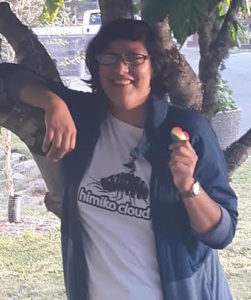
I decided if I couldn’t go to college yet, I’d have to learn a trade to make more money. The Job Corps sounded like a good idea. I was used to being away from my mom, but I’d never been away from my twin sister. We were lucky because we weren’t split up in foster care. My sister’s always been dependent on me, so I worried about her, but I had to do something for myself for once. I was shocked to see how beautiful it was, and how close it was to the ocean.
At first I was scared. Some people were welcoming right away, others less so. But over time, my opinions of people changed. People I didn’t like so much at first were really interesting and nice. I didn’t know if there were other LGBTQ people on campus, so I started the GSA. Now we prefer to call it Genders and Sexuality Alliance instead of Gay Straight Alliance — that’s a new trend. For a while, I let people identify me as a woman because I wasn’t comfortable coming out as trans. Then I met my partner — a Job Corps romance! We were friends on KP duty and got to know each other. He said, “Just be who you are.” Most people accept me, but others don’t really understand, and I enjoy teaching them. For the first time, I feel like I really have a handle on my own life and can make decisions about what I want to do.
Nathaniel Munoz, 19, Student Union building leader, safety leader, former student leader

I graduated from high school and was working at a McDonald’s. Everything was fine, but one day I was sweeping a parking lot and had a realization — what was I doing there? I called my mom and asked her what I should do with my life, and she talked with me about the Job Corps.
My grandfather had gone to the Job Corps in Hawaii. He became a successful plumber. I got in quickly. The biggest problem was leaving my mom since it was just me, her, and my two little brothers. I’d been the man of the house. It’s hard on both of us to be separated. My goal is to help support my mom and family. I want to get a stable job and make better money.
My trade is masonry. I chose that because it’s one of the trades where people get to see what you’ve done. Plumbers are good, but their work is on the inside. With masonry and painting, you get satisfaction with people seeing your work. I’m in Y2Y, so I can work on retention.
When I came here, I was poor and I’d been bullied for being a foreigner, so I try to get on a level with other people and understand them. I focus on stopping bullying, and that means I need to have empathy. I’m also a safety officer and the Student Union head leader, which means I give people a place to relax and find time for themselves. There’s very little privacy here. If you can survive in the residential living, you can survive in the workplace.
Devin Thompson, 19, Honor Guard, transferred from the closed Centennial center
I signed up my senior year of high school in Eugene when I thought my dad was going to die. I wanted to get away from Oregon and find a way to make a better life than my dad and I had. He was making about $700 a month and I knew I could do better than that if I had a trade, so I applied for Centennial.
At first, I wanted welding, but I have tremors in my hand so that wasn’t possible. I got into carpentry instead. I was at the Centennial center for nine months; then we got news the center was closing. My “boss” — the carpentry teacher — wanted me to come with him to the Angell center. It was kind of mixed deal being closer to home, and it was hard to leave Boise.
Everyone I was close to graduated from Centennial except me. It made me wonder if the program was worth fighting for, but I like the Angell center. I’m still working on making new friends, and I want to keep motivating myself to lose weight for fire. Eventually, I want to join the carpentry union as a pile driver or a framer. I want a better life for my kids.
Darrien Smith, 18, Student Government Association secretary, dorm safety leader
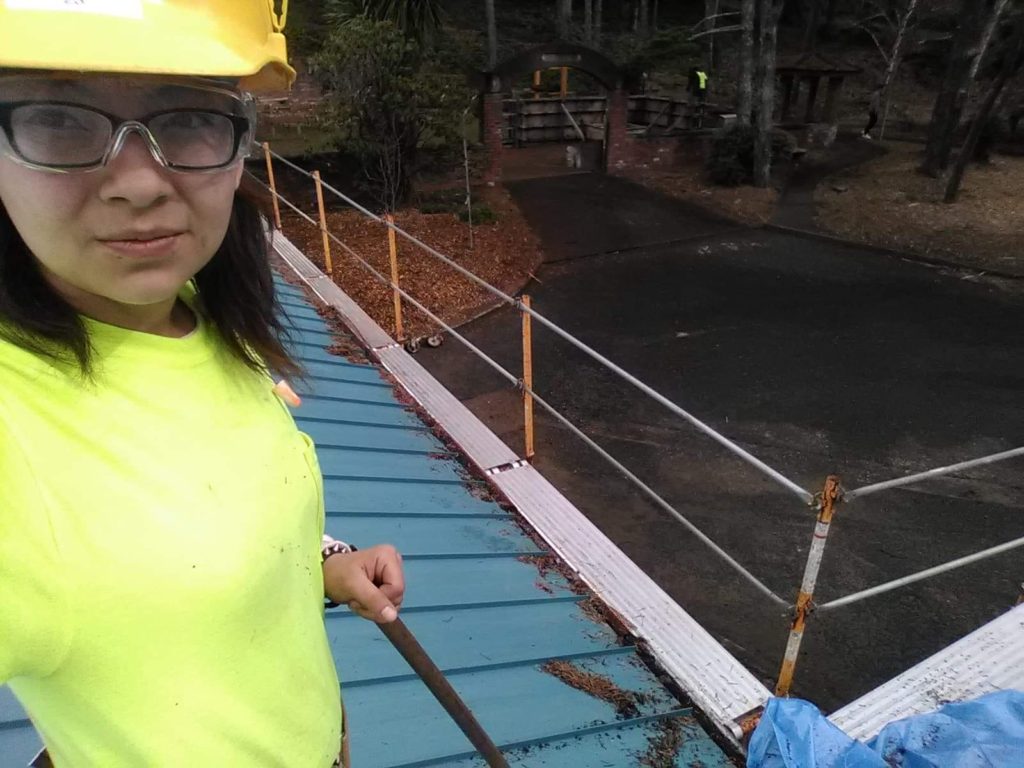
I started dropping out in middle school. I was from Madras, in and out of schools, and I bounced around. I started drinking really bad and after a while, I opened my eyes and decided that wasn’t what I wanted. I didn’t want to spend my life on the side of the road trying to find my next beer.
A few people told me to get into Job Corps. My mom went to the one in Estacada, and my brother was here at Angell. They didn’t think I’d stick with it, but I had too much freedom in high school. I would walk off campus and get into trouble. I chose Angell and committed to it. I wanted the closed campus.
I’ve been here five months and love everything about the program and the people in it. I started off wanting the bare minimum; then I made some bad decisions. I had to go before the review board. Every single staff member fought for me to stay here. Getting that vote of confidence made me look at people differently. I thought it wouldn’t matter if I washed out, but then I saw how staff and students fought for me, and that changed my mindset. It made me more friendly, more trusting toward people.
The change to a contract center would be way too extensive and stressful for students who’ve already been uprooted and had a lot of changes already. It would make a lot of people either walk out or have a breakdown. Since we’ve heard about it, it’s already changed the culture on center already. We’re all really trying to fight for the center. We’re passing out newsletters. Today at 7 o’clock we’re signing letters to go out to senators and other politicians. We’re fighting for this place. We don’t want this change. We’ve had enough of that.



Thank you Elaine, I volunteer tutor at the Angell Job Corps and really appreciate telling the personal stories. These are the types of stories my friends respond to. Betty
Thank you for telling their stories. These students are brave amazing people that I have the privilege of seeing change, strengthen, and find the driving light to make their own live better.
I’m an Angell Job Corp Graduate from 2016 and I can say Job Corp changed my life….. From having no Diploma and working for $80 a day I was 20 years old at the time with no Hope’s of ever seeing my diploma regretting all my choices from High School I didn’t see myself moving forward in life until I found Angell Job Corp they opened a door for me to get my GED I said to myself “I’m already here I mightes well get my Diploma” so I did!! I completed my Edu and my trade and I ended up graduating and working in the Carpenters Union I now make $26.50/hrly have my own house I own 4 cars I have no debt I’m helping my parents out I guess I shall say I’m returning the care they gave me when I was a boy I joined Honor Guard and graduated as captain and presented the Haka warrior Dance!! And I glad I took the opportunity of going to Angell?? Yes I am!!!